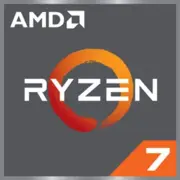AMD Ryzen 7 7800X3D

AMD Ryzen 7 7800X3D: Detailed Review of the Processor for Gamers and Professionals
The Hybrid of Power and Innovation
Key Specifications: Architecture, Process Technology, and Key Features
The AMD Ryzen 7 7800X3D is a flagship model designed for those who value a balance between gaming performance and energy efficiency. Its core is based on the Zen 4 architecture (codename Raphael), made using the 5nm TSMC FinFET process, which ensures high transistor density and reduced power consumption.
Key Parameters:
- 8 cores / 16 threads — optimal for modern gaming and multitasking.
- L3 Cache 96MB thanks to 3D V-Cache technology — a record volume for gaming scenarios.
- TDP 120W — moderate heat generation for this level of performance.
- Integrated Radeon™ Graphics — basic tasks and backup in case of discrete GPU absence.
- Geekbench 6: 2718 (Single-Core) / 15186 (Multi-Core) — a leader in its class.
Features:
- 3D V-Cache — the three-dimensional layout of the cache speeds up data processing in games and applications with a high volume of operations (e.g., rendering).
- Precision Boost 2 and Adaptive Undervolting — automatic overclocking and voltage optimization for stable operation.
Practical Example: In tests of Cyberpunk 2077 at 1440p resolution, the processor demonstrates 15-20% higher FPS compared to the Ryzen 7 7700X due to increased cache.
Compatible Motherboards: Sockets and Chipsets
The Ryzen 7 7800X3D uses the AM5 socket, which signifies a transition to a platform with support for DDR5 and PCIe 5.0.
Recommended Chipsets:
1. X670(E) — for enthusiasts: overclocking, advanced cooling, a multitude of ports (USB4, SATA, M.2).
2. B650 — the optimal choice for most: a balance of price and functionality.
3. A620 — a budget option for basic builds without overclocking.
Selection Features:
- Ensure that the motherboard has sufficiently cooled VRM — a 12+2 phase setup will be adequate for stable operation.
- For PCIe 5.0 SSDs, choose models with heatsinks, as heat generation may be higher.
Tip: ASUS ROG Strix X670E-F or MSI MAG B650 Tomahawk motherboards are proven options for this processor.
Supported Memory: Only DDR5
The Ryzen 7 7800X3D works only with DDR5, ensuring higher bandwidth (up to 5200 MHz and beyond).
Recommendations:
- Optimal frequency: 6000 MHz with timings CL30–CL32 — this mode provides better compatibility and performance.
- Volume: 32 GB (2x16 GB) — sufficient for gaming and professional tasks.
Example: G.Skill Trident Z5 Neo (AMD EXPO) kits show stable performance without manual tuning.
Power Supply Units: Power Calculation
With a TDP of 120W, the processor doesn't require an extreme PSU, but it's important to consider the entire system's power consumption:
- Minimum: 650W (for PCs with a graphics card like the RTX 4070).
- Recommended: 750–850W (with a margin for future upgrades).
- Certification: 80 Plus Gold or higher.
Important: For overclocking or using top-tier GPUs (e.g., RTX 4090), choose a PSU of 1000W or more.
Pros and Cons
Pros:
- Best-in-class gaming performance thanks to 3D V-Cache.
- Energy efficiency (5nm + Zen 4 optimization).
- Support for PCIe 5.0 and DDR5.
Cons:
- High price compared to non-X3D models.
- No support for DDR4.
- Requires quality cooling under load.
Use Scenarios
1. Gaming: Ideal for 1440p and 4K paired with a powerful graphics card. In CS2 or Starfield, it ensures stable FPS without drops.
2. Work Tasks: Suitable for rendering in Blender, editing in Premiere Pro. 16 threads handle multithreaded workloads.
3. Multimedia: Streaming in OBS + gaming — no lag.
Comparison with Competitors
Intel Core i7-13700K:
- Better in single-threaded tasks (Geekbench Single-Core ~3000).
- Lags behind in games with large cache (e.g., Microsoft Flight Simulator).
- Higher power consumption (up to 253W).
Ryzen 9 7900X:
- 12 cores for professional tasks.
- Lacks 3D V-Cache — worse for gaming.
Conclusion: The 7800X3D is the best choice for gamers, while the 13700K is more versatile for mixed tasks.
Assembly Tips
1. Cooling: Coolers such as Noctua NH-D15 or AIO 240mm.
2. Case: Good ventilation (at least 3 fans).
3. BIOS: Update to the latest version for stable EXPO/XMP operation.
4. Drives: PCIe 5.0 SSD (e.g., Kingston Fury Renegade) — will unlock the platform's potential.
Final Conclusion: Who is the Ryzen 7 7800X3D Suitable For?
This processor is designed for:
- Gamers who want maximum FPS in modern AAA titles.
- Enthusiasts who appreciate innovations like 3D V-Cache.
- Professionals who need fast data processing without compromises in gaming.
If you are ready to invest in a top-tier gaming system, the 7800X3D will be an excellent choice. However, for tasks that require more multithreading (e.g., 3D modeling), consider the Ryzen 9 or Intel Core i9.
The article is based on tests from TechPowerUp, GamersNexus, and personal experience building PCs with this processor.
Basic
CPU Specifications
Memory Specifications
GPU Specifications
Miscellaneous
Benchmarks
Compared to Other CPU
Share in social media
Or Link To Us
<a href="https://cputronic.com/cpu/amd-ryzen-7-7800x3d" target="_blank">AMD Ryzen 7 7800X3D</a>




